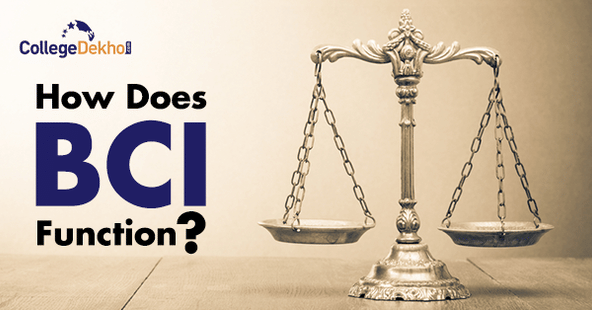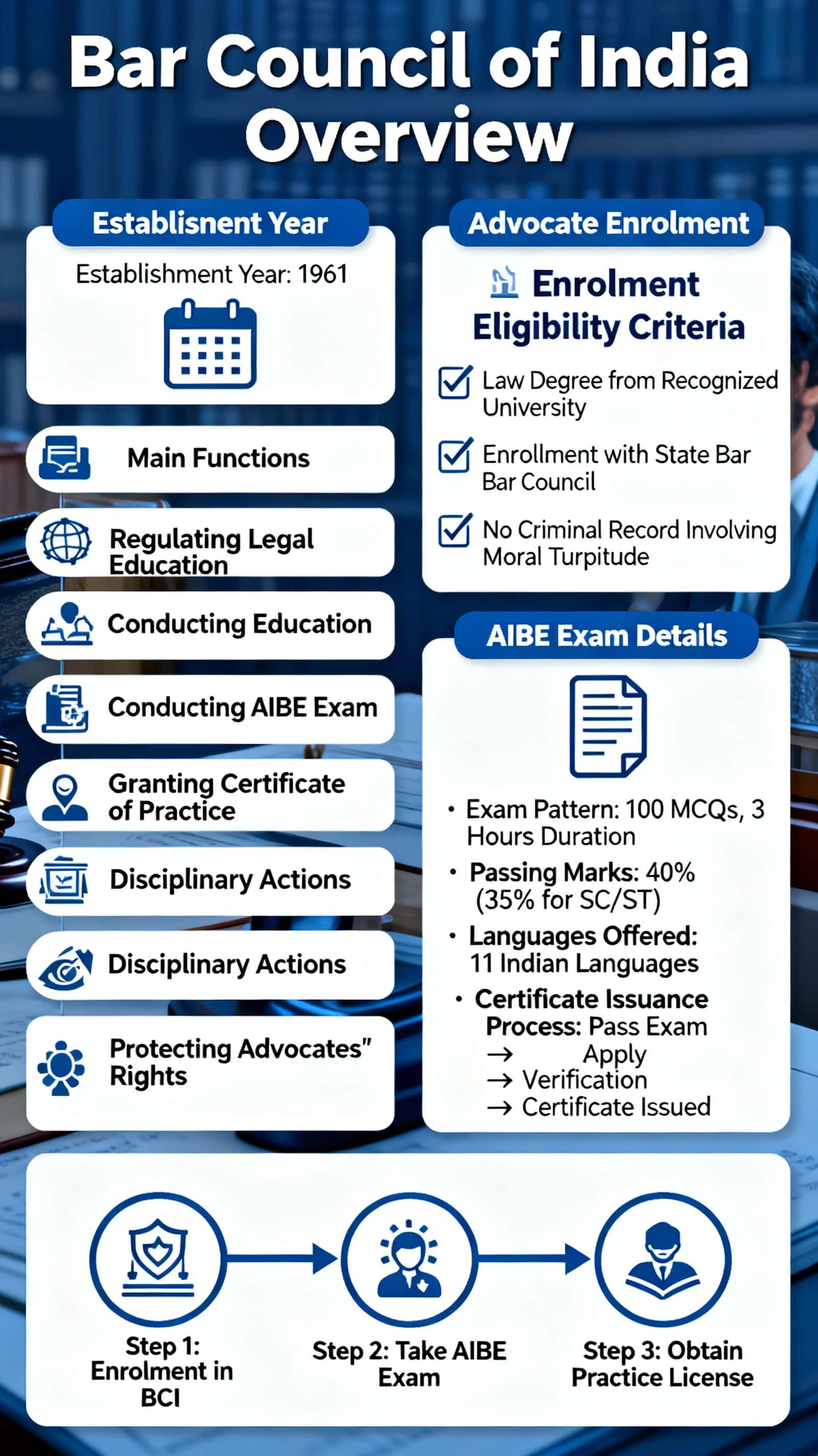The Bar Council of India (BCI) has several functions and every law aspirant is expected to know them. Check the details of BCI as well as the All India Bar Examination (AIBE) here.

In the past few years, it has been observed that Law has emerged as one of the most sought after fields for pursuing higher education in India. The number of students seeking admission to the top law colleges of the country has grown in leaps and bounds and the beginning of every academic cycle witnesses a surge in applications to law schools which surpasses that of the previous year. The young students of the nation are taking an interest in the study of law and have aspirations to make a career in the field of law . With such aims and ambitions, seeking knowledge about the discipline and profession becomes mandatory. There are many aspects and parts of the field of law that every law aspirant must be aware of. As the stream is quite vast, it becomes a little difficult and confusing to keep up with every small detail but that should not stand in the way of a future advocate or litigator. Among these important facets of law is the Bar Council of India and it is imperative for all students to know the duties and functions of the BCI.
Establishment of Bar Council of India
After the Constitution, there was a need for an All India Bar Council and that’s when BCI came into existence. In the Annual Inter-University Board meeting held at Madras, a statement was passed to establish an All India Bar which would retain the uniformity of conducting law examinations across different law universities in the country.
An ‘All India Bar Committee’ report headed by S.R. Das was submitted which resulted in the formation of the Bar Council of India. Establishing a bar council for every state as well as a central bar council was proposed in the report. In 1961, after the introduction of the Advocates Act, executed the reforms proposed by the All India Bar Committee along with the Law Commission and Bar Council of India were formed.
What is the Bar Council of India?
The Bar Council of India, abbreviated as BCI, is a statutory body which was formed under the Advocates Act, 1961. It was created by the Parliament for regulating and representing the Indian bar. With its headquarters in Delhi, the BCI is responsible for regulating legal education and professional standards in the country. This includes standardising of law education and framework of the course at all the universities and law colleges in India, directing all the state bar councils, as well as conducting the All India Bar Examination (AIBE) . The constitutional body of the Bar Council of India not only performs the regulatory functions by exercising disciplinary jurisdiction over the bar and formulating standards of professional etiquette and conduct but also has the responsibility of setting standards for legal education in the nation and granting recognition to colleges and universities whose degrees in law are set to serve as a qualification of students for enrolment as an advocate.
The All India Bar Examination, or AIBE, is conducted for granting the 'Certificate of Practice' to all advocates who are eligible to practise law in India. The funds for welfare schemes that are created for the economically weaker and the physically handicapped advocates are also provided by the BCI. It also performs particular representative functions by protecting the privileges, rights, and interests of advocates. It is the duty of the enrolment committee of BCI to verify the application forms of the candidates and they are given a 'Certificate of Enrolment'. The Bar Council of India consists of members who are chosen from the law fraternity of the country.
Functions of the BCI
According to Section 7 of the Advocates Act of 1961, it is specified that BCI is the representative and regulatory directive for legal education as well as the legal profession within the country of India. It is extremely important for every law aspirant to know the functions of the Bar Council of India. The following list has been prepared in an attempt to provide a condensed list of BCI functions. Candidates can go through it and enhance their knowledge about the functions of BCI.
- The BCI lays down professional conduct standards and propriety for advocates.
- Promoting and supporting law reforms is a major function of the Bar Council of India.
- It also lays down procedures that are to be followed mandatorily by the various disciplinary committees.
- The BCI promotes legal education and lays down the standards of legal education in the country.
- Protecting the interests, rights, and privileges of advocates is the responsibility of the BCI.
- It also deals with and disposes of any matter that is referred by any of the SBC (State Bar Council).
- The BCI conducts seminars on legal subjects by renowned jurists and publishes papers and journals that are of legal interest.
- It comes to the Bar Council of India to determine and approve whether a law degree from a particular university provides an adequate qualification for enrolling someone as an advocate or not.
- It organises and provides legal assistance to the poor and less fortunate.
- Only the BCI is given the authority to manage and invest the funds of the BCI.
- It recognising foreign law qualifications that are obtained from countries other than India for the individual’s admission as an advocate.
- The BCI provides for electing its members who will be endowed with the responsibility of managing and administering the Bar Councils.
- The BCI also organises and provides legal assistance to the students who belong to the scheduled caste (SC).
The Bar Council of India (BCI) can also initiate funds for the following purposes:
- Giving legal aid
- Giving financial help to organise welfare schemes for the poor, disabled or other advocates
- Establishing law libraries
The Bar Council of India can also accept grants, donations and gifts for any of these objectives.
Also Read: Corporate Lawyer Vs Practising Lawyer - Which is Better?
Eligibility for Enrollment of Advocates to the BCI
The qualifications that every individual is required to possess in order to be permitted to enrol in the Bar Council of India have been stated in Section 24 of the Advocates Act, 1961. This section stipulates that conditional on the provisions of the Act and the rules framed as per it, an individual will be qualified and will be considered eligible to be enrolled as an advocate on a State roll provided he/ she meets all the prerequisites mentioned below.
- The candidate should be an Indian citizen. A resident of any other country can be permitted as an advocate on a State roll if the Indian citizens who are duly qualified, have been given the authority to practice law in the other nation. This is further subject to other limitations.
- The candidate should not be less than 21 years of age.
- The candidate must have obtained a law degree after he/ she has completed three years of a law course from any university or institution within India which has been recognised for the objective and intent of the Act by the Bar Council of India. In a few cases, an advocate who has obtained a degree from a university which is not in India may be admitted if his/ her degree has been recognised for the intent and objective of this Act by the BCI.
- The candidate must also satisfy all the other prerequisites that have been stipulated in the rules that are made by the BCI.
The present chronology requires an individual who wishes to get enrolled as an advocate to first clear the exam of the Bar Council of India. Subsequently, the candidate can enrol himself/ herself under any State Bar Council (SBC). All the individuals who are eligible are admitted as advocates on the rolls of these SBCs. The SBCs have been given the power by the Advocates Act to formulate their own rules that concern the enrolment of advocates. The enrolment committee of the Council will examine the application of the candidate. Different rules have been framed by different SBCs and each of them follow their own rules for the enrolment of a candidate as an advocate. Nevertheless, many of the State Bar Councils require candidates to apply together with their mark sheets and law degree along with a judicial stamp paper and the necessary fees. The candidates are required to send the application fee for enrollment with the SBC and the BCI through separate Demand Drafts to each.
All candidates who are admitted as advocates by any SBC are considered eligible to take the All India Bar Exam that is conducted by the Bar Council of India. The state-enrolled advocates who pass the AIBE are granted a Certificate of Practice (COP) that enables them in practising law as an advocate in any High Court or any lower court within the territory of India.
Different Committees of BCI
The Bar Council of India comprises certain committees that help in the working of the Council. The members of these committees are elected from within the Council. The different committees are:
- Executive Committee: This committee is responsible for managing the allocation and management of funds, audits, accounts, legal publications, managing libraries, etc.
- Disciplinary Committee: They look into the disciplinary matters of the State Bar Councils and complaints made by common people against the lawyers for professional wrongdoing.
- Legal Education Committee: Visit and inspect different legal universities, manage legal education and recommend to the Council legal education standards are the main work of this committee.
- Advocate Welfare Association: Takes care of the applications given by advocates for welfare schemes and measures and confirms them.
- Building Committee: It controls the establishment Council’s offices.
- Legal Aid Committee: This committee provides legal aid for people who are in need.
What is AIBE?
Organised by the Bar Council of India, AIBE is a national level examination that has been designed in order to fulfil the objective for assessing the capability of advocates who aspire to practice law in India. This All India Bar Examination is held twice every year and it tests advocates on substantive and procedural law. The function of the exam is to appraise skills at a fundamental level and then fix a minimum benchmark that is to be considered for anyone’s admission to practice law. Certificates of Practice (CoP) are awarded by the BCI to the candidates who pass the examination and they become eligible to practice law in India.

Also Read: List of Integrated Law Courses in India
Eligibility Criteria for AIBE
Along with all the other details of the exam, the eligibility criteria of AIBE are also set by the BCI. Candidates must check the AIBE eligibility criteria before proceeding to submit their applications because if the BCI finds that an applicant is unqualified it has the full authority to cancel and disqualify their application. The eligibility criteria for AIBE that candidates must know have been explained below.
- The candidate must be a resident of India.
- The candidate must have completed his/ her bachelor’s degree in law and should either have a three-year LLB degree or a five-year integrated LLB degree from any university that is recognised.
- The candidates must be enrolled with any State Bar Council (under Section 24 of the Advocates Act of 1961)
- The candidate should have an advocate ID Card or an enrollment card that is issued by the State Bar Council (SBC).
- No age limit has been set for candidates to appear for the examination.
- There is no limit to the number of attempts for AIBE.
- The BCI has not prescribed any minimum marks for qualifying the exam.
Stay tuned to CollegeDekho to know more about the field of law and law admissions in India . In case the candidates have any queries, they can reach out via the QnA Zone of CollegeDekho and have their doubts solved by our experts.
Are you feeling lost and unsure about what career path to take after completing 12th standard?
Say goodbye to confusion and hello to a bright future!

FAQs
There is no upper age limit set by the BCI to appear for AIBE. Candidates who have completed a UG degree in law are eligible to appear for AIBE. the AIBE application fee can be paid through any online payment gateway such as net banking, credit card, debit card, etc. However, the AIBE application fee is non-refundable. Once you submit the form and make the payment, you cannot ask for a refund if you don’t sit for the exam.
The AIBE contains questions from various law specialisations subjects. They are Family Law, Code of Civil Procedure, Public Interest Litigation, Constitutional Law, Cyber Law, Labour and Industrial Laws, Indian Penal Code, and Evidence Act. A total of 100 questions are asked in the AIBE exam. The AIBE syllabus is quite detailed as it covers almost all the essential specialisations and aspects of the study of law.
AIBE or All India Bar Examination is conducted by the Bar Council of India (BCI). Candidates who wish to practise law in India need to take and clear the AIBE examination. The examination can be taken in 11 regional languages i.e., Assamese, Bengali, English, Gujarati, Hindi, Kannada, Marathi, Oriya, Punjabi, Tamil, and Telugu. AIBE is conducted twice a year, in the months of May and September/October.
All India Bar Examination (AIBE) is a certification examination that is held every year. After clearing the exam BCI will award the Certificate of Practice to the eligible candidates. The exam is conducted to check the capability of the candidate to practice law in India. Law graduates of any age group can apply for the exam. AIBE is held in the offline mode and candidates have to take the exam in a pen-and-paper method.
You can apply online for the All India Bar Examination (AIBE) on the official website of the exam. The AIBE exam is supposed to be held in the month of October-November. The AIBE exam is held every year for the 3-year and 5-year law graduates. Only law graduates can apply for the exam.
The difficulty level of the Bar Council exam, that is AIBE, is a moderate level exam. The candidates don’t have to compete with each other in the examination, they just need to get 40% to clear the AIBE exam. The examination is conducted in 40 cities across India in 15 different languages. Try to solve sample papers as many as you can to clear the exam in one go.
To become an advocate you first need to enrol yourself in your respective state bar council. After that, you have to clear the AIBE exam. After passing the Bar exam, you will be enrolled as a certified advocate. The AIBE exam is very important and essential for practising law in India.
According to Section 7 of the Advocates Act, 1961, the functions of the BCI are:
- Establishing procedures that the disciplinary committees of legal education need to follow.
- Setting up professional standards and propriety for lawyers.
- Protecting every lawyer's rights, interests and privileges.
- Promoting legal reforms in India.
- Setting and promoting legal education standards in India.
- Dealing and disposing of the matters of the State Bar Council (SBC).
The BCI certificate also known as the Certificate of Practice (CoP) is issued by the BCI to the candidates after passing the AIBE test. The BCI Certificate of Practice is important as it will make the eligible candidates practice law in India. The law graduates have to register with their state's bar council on payment of INR 600 and INR 150 to the BCI.
The Bar Council of India (BCI) whose headquarter is in Delhi is the constitutional body formed under the Advocates Act, 1961. The main purpose of BCI is to regulate legal education and professional standards in India. BCI is responsible for directing the state bar councils and framing the coursework of law colleges and universities. The All India Bar Examination (AIBE) is conducted by BCI to grant a ‘Certificate of Practice’ to advocates who want to practice law in India.
Was this article helpful?



















Similar Articles
AILET 2026 Seats for SC Category: Total No. of Seats with Fees
AILET 2026 Seats for OBC Category: Total No. of Seats with Fees
AILET 2026 Seats for General Category: Total No. of Seats with Fees
Private Law Colleges in India Accepting AILET Scores
AILET 2026 Expected Cutoff for All Categories
Can I pursue JD in the US after BA LLB from India?